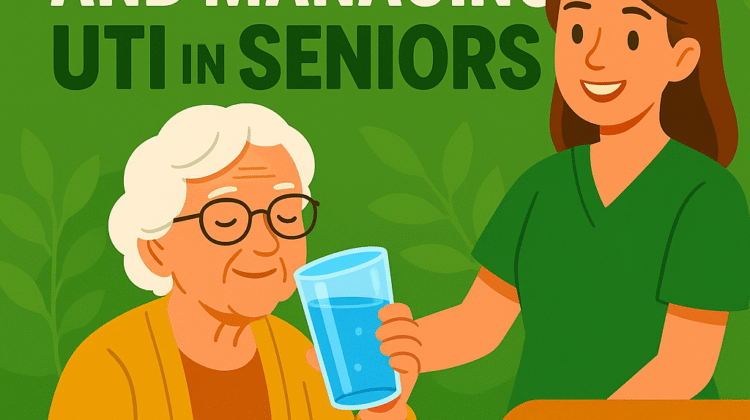
Understanding and Managing UTI in Seniors: Prevention, Symptoms, and Care in Assisted Living
Urinary tract infections (UTIs) are among the most common health issues affecting older adults, yet they’re often overlooked or misdiagnosed. In seniors, UTIs can appear differently than in younger adults. Instead of the classic burning or urgency, symptoms might show up as sudden confusion, fatigue, or even falls. These unusual signs can make infections harder to catch early—but understanding them can make all the difference in your loved one’s health and comfort.
Table of Contents
- What Makes Seniors More Vulnerable to UTIs
- How to Recognize the Often Missed Symptoms
- The Importance of Early Detection and Diagnosis
- Treatment Options and Preventive Care
- Supporting Long-Term Health and Comfort in Senior Living Communities
What Makes Seniors More Vulnerable to UTIs
As people age, their bodies naturally change in ways that make urinary tract infections more likely. The immune system weakens, muscles lose strength, and underlying health conditions become more common. Each of these factors contributes to why UTIs are so frequent in older adults—and why prevention requires attention to daily habits and overall wellness.
1. Age-Related Physical Changes
The bladder and kidneys lose elasticity and efficiency with age. The bladder doesn’t always empty completely, leaving behind small amounts of urine where bacteria can grow. Women experience hormonal changes after menopause that thin the lining of the urethra and bladder, reducing natural protection against infection. Men may face prostate enlargement, which can cause urine retention—a major contributor to bacterial buildup.
2. Dehydration and Limited Fluid Intake
Many older adults drink less water to avoid frequent bathroom trips, especially at night. But when the body doesn’t get enough fluids, urine becomes concentrated, creating an ideal environment for bacteria to multiply. Encouraging small, consistent sips throughout the day can make a noticeable difference in UTI prevention.
3. Chronic Health Conditions
Conditions like diabetes, kidney disease, and neurological disorders affect how the body manages waste and controls the bladder. Seniors with dementia or memory loss may not recognize or communicate discomfort, which can delay treatment. This is why staff training and attentive care are so important in senior living and memory care settings.
4. Catheter Use and Limited Mobility
Some seniors require urinary catheters, which can introduce bacteria directly into the bladder. Limited mobility can make personal hygiene more difficult, increasing infection risk. Assisted living communities that prioritize regular toileting schedules, good hydration, and supportive hygiene routines help reduce these risks significantly.
5. Medications and Weakened Immunity
Certain medications—like diuretics or immune-suppressing drugs—can impact how the urinary system functions. Combined with a weaker immune response, these factors can make seniors more vulnerable to infection and slower to recover.
Why This Matters for Families
If you’re exploring senior care options, look for communities that emphasize proactive health monitoring, hydration, and infection prevention. Quality assisted living and memory care communities, such as those in Katy, TX, often include wellness programs designed to reduce infection risks before they become serious issues.
Understanding UTI risks isn’t just about avoiding discomfort—it’s about safeguarding a loved one’s long-term well-being. In older adults, untreated infections can lead to delirium, hospitalization, or even lasting cognitive decline. Awareness and prevention are your strongest tools for keeping your loved one healthy and thriving.
How to Recognize the Often Missed Symptoms
Urinary tract infections in seniors can look nothing like the typical symptoms most people expect. Burning during urination or frequent trips to the bathroom may never appear. Instead, signs often show up in subtle or confusing ways, which can delay treatment. Knowing what to look for—and acting quickly—can prevent serious complications.
1. Behavioral and Cognitive Changes
One of the earliest signs of a UTI in older adults is a sudden change in behavior or awareness. A senior who was previously alert might appear confused, disoriented, or unusually sleepy. Family members sometimes mistake this for the progression of dementia, but it’s often an infection causing temporary delirium. If your loved one suddenly seems “off,” a UTI should always be considered.
2. Unexplained Fatigue or Weakness
Infections can drain the body’s energy even before pain or fever develop. Seniors may appear unusually tired, withdrawn, or unsteady when walking. These symptoms are often subtle but important. A simple urine test can confirm whether an infection is behind the sudden fatigue.
3. Mood and Personality Shifts
Seniors with UTIs can become irritable, anxious, or unusually emotional. These changes can appear overnight. Caregivers may notice increased restlessness, agitation, or resistance to care routines. These mood shifts can be distressing to families, but they’re often reversible once the infection is treated.
4. Loss of Appetite or Change in Eating Habits
When the body fights infection, appetite often declines. Seniors may refuse meals or only eat small portions. Dehydration can worsen this, leading to a cycle where low fluid intake increases infection risk. In assisted living communities that focus on wellness, staff are trained to recognize when appetite changes signal something deeper than picky eating.
5. Falls and Physical Instability
UTIs can affect coordination and balance, increasing fall risk. Seniors might experience dizziness or slower reaction times. In communities offering memory care or skilled nursing, staff monitor these signs closely since falls are a common reason hospital visits increase during infections.
6. Incontinence or Changes in Bathroom Patterns
More frequent urination, accidents, or strong-smelling urine can signal an infection. Even a slight change in bathroom habits—such as suddenly waking up at night to urinate or avoiding the restroom altogether—warrants attention. These symptoms can develop gradually or appear suddenly.
Why Symptoms Are Often Missed
Families and caregivers sometimes attribute changes in mood or cognition to aging or dementia, especially in seniors who already have memory challenges. This misunderstanding can delay care. UTIs can progress quickly in older adults, sometimes leading to sepsis if untreated. That’s why education and proactive observation are so vital in both home care and assisted living environments.
In communities offering high-quality senior care, like those found throughout the Katy area, nursing teams often perform routine health checks that include hydration monitoring, urine screening, and behavioral tracking. This kind of daily observation helps catch infections before they escalate.
When to Seek Medical Attention
If your loved one suddenly seems confused, lethargic, or unsteady, don’t wait for traditional UTI symptoms to appear. Contact their healthcare provider right away. A quick urine test can confirm an infection, and early antibiotics or hydration therapy can prevent more serious complications.
The goal is not just to treat infections but to preserve overall health, independence, and peace of mind—for both the senior and their family.
The Importance of Early Detection and Diagnosis
Timely detection of urinary tract infections in seniors is one of the most powerful ways to protect their health. When caught early, a UTI is usually simple to treat. But if missed, it can quickly spread to the kidneys or bloodstream, leading to hospitalization or long-term cognitive decline. The difference often comes down to awareness, observation, and action.
1. Why UTIs Escalate So Quickly in Older Adults
In younger people, UTIs usually stay confined to the bladder. In seniors, weakened immunity and slower body systems allow bacteria to multiply and travel faster. Dehydration and incomplete bladder emptying create ideal conditions for infection to spread. Because older adults may not feel or express pain clearly, days can pass before anyone realizes what’s happening.
Even a short delay in treatment can cause the infection to move from the bladder to the kidneys, and from there into the bloodstream—a dangerous condition known as sepsis. That’s why family members and caregivers should never dismiss small changes in behavior, appetite, or alertness.
2. The Role of Routine Screening
Routine urine tests, especially for seniors with a history of recurrent infections, can help catch problems early. Many assisted living and memory care communities include regular wellness checks that track hydration, medication side effects, and bathroom patterns. These preventive systems make early diagnosis easier and reduce the need for emergency interventions.
Families can also request that a primary care provider include periodic urine screenings during regular visits. This small step can reveal infections before symptoms become visible.
3. What Happens During Diagnosis
When a UTI is suspected, healthcare providers typically request a urine sample for analysis. This simple test identifies bacteria and determines which antibiotics will work best. In some cases, blood tests or imaging may be used to rule out kidney infection or other underlying conditions. For seniors with dementia or communication barriers, these diagnostic tools are essential for confirming what observation alone might miss.
4. The Impact of Delayed Diagnosis
Delayed detection doesn’t just increase physical risks—it can also lead to emotional and cognitive strain. Seniors who experience confusion or delirium during infection often feel anxious and disoriented. Families may misinterpret these changes as permanent decline, when they’re actually temporary. Prompt diagnosis and treatment usually restore mental clarity within days.
5. How Families Can Support Early Detection
You don’t need medical training to spot the warning signs early. Keep track of your loved one’s hydration, appetite, energy levels, and bathroom routines. Note sudden changes in alertness or personality. If you suspect something’s off, call their healthcare provider right away. It’s always better to rule out infection than to wait and risk escalation.
If your loved one lives in a senior living community—whether assisted living or memory care—ask how staff monitor for early signs of infection. The best communities encourage family involvement and communication about subtle changes in behavior or health. When caregivers, families, and healthcare providers work together, infections can often be prevented before they start.
Building a Culture of Prevention
Early detection is more than a medical process—it’s part of a culture of attentive, compassionate care. Communities that prioritize proactive health monitoring, hydration programs, and personalized care plans tend to see fewer infections overall. For families exploring senior living options, these are the details that separate good care from great care.
Treatment Options and Preventive Care
When a urinary tract infection occurs, timely and appropriate treatment is critical to restoring health and preventing recurrence. Seniors are more vulnerable to complications, so the approach must be both medical and lifestyle-driven. Effective care involves accurate diagnosis, proper medication, and long-term prevention strategies that strengthen the body’s natural defenses.
1. Standard Treatment for UTIs in Seniors
The most common treatment for a UTI is a course of antibiotics prescribed after a urine test confirms infection. The specific medication depends on the bacteria identified. In seniors, doctors may also monitor kidney function to ensure antibiotics are processed safely.
If the infection is severe or spreading, hospitalization and intravenous antibiotics may be necessary. In some cases, dehydration must be treated with IV fluids to help flush out bacteria and stabilize the patient.
Even when symptoms improve quickly, it’s essential to complete the full course of antibiotics. Stopping early can allow bacteria to return stronger and more resistant, leading to chronic infections.
2. Hydration: The Simplest, Most Effective Prevention
Dehydration is one of the most preventable causes of UTIs in seniors. Encouraging your loved one to drink small amounts of water throughout the day keeps urine diluted and bacteria from multiplying. Herbal teas, fruit-infused water, or broth can help if plain water isn’t appealing.
In many assisted living communities, caregivers track fluid intake as part of wellness monitoring. This simple habit prevents countless infections each year and improves overall kidney health.
3. Hygiene and Personal Care
Proper hygiene plays a major role in preventing bacterial buildup. Seniors who need help with toileting or mobility should receive gentle, consistent care to maintain cleanliness. Wiping front to back, using mild soap, and avoiding irritating products like perfumed wipes or powders reduces risk significantly.
Clean clothing, frequent linen changes, and accessible bathrooms are also important. Small details in daily care routines can make the biggest difference in infection prevention.
4. Managing Chronic Health Conditions
Underlying conditions such as diabetes, Parkinson’s disease, or incontinence can increase UTI risk. Managing these conditions effectively—through medication, diet, and regular medical care—helps maintain bladder health. Good blood sugar control, for example, can significantly reduce bacterial growth in the urinary tract.
In communities offering specialized memory care or assisted living services, staff are often trained to monitor these interconnected health factors closely. They ensure that conditions like diabetes or mobility challenges are managed in ways that support overall infection prevention.
5. Lifestyle and Dietary Adjustments
Simple, sustainable changes can strengthen urinary health:
- Encourage regular bathroom trips. Avoid holding urine for long periods.
- Promote physical activity. Gentle movement supports circulation and bladder function.
- Incorporate probiotics. Yogurt and other probiotic-rich foods may help balance healthy bacteria.
- Avoid excessive caffeine and alcohol. Both can irritate the bladder and cause dehydration.
Families can work with caregivers to create small daily habits that fit naturally into a senior’s lifestyle. Prevention doesn’t need to feel clinical—it’s about comfort, dignity, and consistency.
6. Reducing Catheter Use When Possible
If your loved one uses a catheter, maintaining strict hygiene and minimizing use duration are essential. Regular replacements, sterile handling, and monitoring for discomfort or changes in urine color can prevent infection. Communities that follow evidence-based catheter care protocols greatly reduce infection rates among residents.
The Power of Proactive Care
Treating UTIs effectively means more than clearing up an infection—it’s about protecting long-term health. Seniors who stay hydrated, maintain good hygiene, and receive consistent medical oversight experience fewer infections and better overall wellness.
Assisted living communities that build prevention into daily care routines, like those found in the Katy area, help residents live more comfortably and confidently. Families can take comfort knowing their loved one’s health is being supported with both compassion and attention to detail.
Supporting Long-Term Health and Comfort in Senior Living Communities
Preventing urinary tract infections in seniors isn’t just a matter of medical care—it’s a reflection of quality of life. A senior living community that prioritizes wellness, hydration, and dignity can dramatically reduce infection risk and improve comfort for residents. Families who understand what to look for can make more confident choices about care.
1. Creating a Wellness-Focused Environment
The best assisted living and memory care communities integrate UTI prevention into everyday routines. They track hydration, encourage mobility, maintain clean facilities, and promote healthy bathroom habits. Residents are reminded to drink fluids regularly, and caregivers monitor for any changes in alertness, appetite, or behavior.
When these small actions are performed consistently, they build a strong foundation for health. Families can support this by staying engaged—asking how hydration is monitored, whether staff are trained in infection prevention, and how communication happens when health changes are noticed.
2. The Role of Personalized Care
Each senior’s body and medical history are unique. Personalized care plans are essential for effective prevention. A resident with diabetes, for example, may need different support than someone with mobility challenges. Individualized care ensures that risk factors are managed holistically, reducing the chance of infections while promoting comfort and confidence.
Families should look for communities where care teams collaborate with doctors, nurses, and family members to adjust plans as needs evolve. This ongoing coordination makes all the difference between reactive and truly proactive care.
3. Building Trust Between Families and Care Teams
Open communication builds trust—and trust leads to better outcomes. Families should feel comfortable asking questions about a loved one’s care and expressing concerns. When caregivers, nurses, and families share information openly, potential problems are caught earlier and resolved faster.
Quality communities emphasize transparency. They provide regular health updates, listen to family input, and approach care with empathy and attentiveness. This level of connection gives families peace of mind knowing their loved one is seen, heard, and well cared for.
4. Emotional and Cognitive Well-Being
Beyond the physical impact, UTIs can take an emotional toll. Confusion, discomfort, and behavioral changes can leave seniors feeling frightened or frustrated. Supportive care environments focus on reassurance and comfort, helping residents recover mentally and emotionally as well as physically.
Engagement programs, social interaction, and personalized attention can speed recovery and reduce recurrence. When seniors feel secure and cared for, their overall resilience improves.
5. Choosing the Right Community
When researching assisted living or memory care in Katy, TX, families should ask specific questions about infection control and resident wellness:
- How are hydration and toileting needs managed daily?
- What steps do you take to prevent UTIs in residents?
- How does your staff recognize early signs of infection?
- How are families informed if health concerns arise?
Communities that can answer these confidently demonstrate a proactive commitment to senior health and safety. Prevention isn’t just a program—it’s part of the culture.
What are the early signs of a UTI in elderly adults?
Early signs can include confusion, fatigue, irritability, or sudden changes in mood and behavior. Seniors may not report pain or burning, so families should watch for cognitive or physical changes rather than waiting for typical symptoms.
How do you prevent urinary tract infections in seniors?
Prevention starts with hydration, hygiene, and regular bathroom habits. Encourage your loved one to drink water throughout the day, maintain clean personal care routines, and stay physically active. In assisted living communities, staff can help manage these habits daily.
Why do UTIs cause confusion in elderly adults?
When infection spreads, it triggers inflammation and affects brain function. Seniors are especially sensitive to these changes, which can cause delirium, disorientation, and memory lapses. These symptoms usually resolve once the infection is treated.
How are UTIs treated in seniors?
Treatment usually involves antibiotics prescribed after a urine test confirms infection. Severe cases may require IV fluids or hospital care. It’s important to complete the full medication course, even if symptoms improve early.
Can dehydration cause UTIs in older adults?
Yes. Dehydration concentrates urine, making it easier for bacteria to multiply. Encourage frequent fluid intake, even small sips, to help flush out the urinary system and maintain kidney health.
What happens if a UTI goes untreated in a senior?
Untreated infections can spread to the kidneys or bloodstream, leading to serious complications like sepsis. In seniors, this can also trigger confusion, falls, or hospitalization. Prompt diagnosis and treatment are essential.
How do assisted living communities help prevent UTIs?
Quality assisted living and memory care communities, such as those in Katy, TX, emphasize prevention through regular hydration checks, wellness monitoring, and personal care routines. Staff are trained to recognize early warning signs and communicate with families quickly.
Is it common for seniors with dementia to get UTIs?
Yes. Seniors with dementia are more prone to infections because they may forget to drink water or have difficulty communicating discomfort. Caregivers trained in memory care know how to detect subtle changes that suggest infection.
What foods help prevent UTIs in seniors?
Foods rich in vitamin C, probiotics, and antioxidants—like berries, yogurt, and leafy greens—can support urinary health. A balanced diet and steady hydration work together to reduce infection risk.
When should families seek medical care for a suspected UTI?
If your loved one suddenly seems confused, unusually tired, or off-balance, contact their healthcare provider immediately. Don’t wait for classic symptoms like pain or burning to appear. Early treatment prevents complications and supports faster recovery.
Understanding and managing UTIs in seniors is about more than medicine—it’s about compassion, consistency, and awareness. Families who learn to recognize subtle warning signs, encourage hydration, and partner closely with care teams can protect their loved one’s health and peace of mind. In the right environment, prevention becomes second nature—and seniors thrive with comfort, dignity, and confidence.



